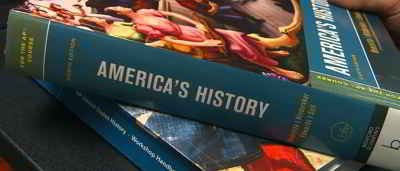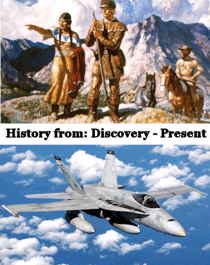

Oregon History
Historic Facts & Overview of Oregon History
Take a peek at Oregon history. Discover an overview of Oregon's rich history, heritage, historic events, and culture.
Spanish sailors in search of a northwest passage were the first Europeans to see what is known today as Oregon. Settlers traveling in wagon trains over the Oregon Trail in the 1840s followed the missionaries who had come in the 1830s. Oregon was admitted as the 33rd state in 1859. Oregon is a state of great natural beauty with places such as Crater Lake National Park and the Columbia River Gorge. Its mountains, covered in forests, make Oregon the leading state in the production of wood products. The state flower is the Oregon grape, and the capital is Salem. The origin of the state's name is unknown, but one theory holds that it may have come from the Wisconsin River, shown in a 1715 French map as "Ouaricon-sint."
Overview of Oregon History and Heritage
Spanish and English sailors are believed to have sighted the Oregon coast in the 1500s and 1600s. It was an American, however, Captain John Gray, who in 1792 discovered the great river and named it for his ship, The Columbia. Captain Gray was one of the first white men to enter Oregon. Capt. James Cook, seeking the Northwest Passage, charted some of the coastline in 1778.
This discovery prompted Thomas Jefferson in 1804 to send the exploring team of Lewis and Clark overland to gain more knowledge of the region and to find out if there was a northwest passage. In 1805 the Lewis and Clark expedition explored the area. They found that the passage did not exist, but laid claim to the territory. Their expedition, along with Captain Gray's trip, gave the United States a strong stake in the land.
Early trappers and fur traders made exciting explorations, finding the bounty that Oregon provided. The British Hudson's Bay Company, led by Dr. John McLoughlin, became the dominant force in the economy. This fur-trading company directed activities throughout the region and built the original capital of the Oregon Territory in Oregon City at the northern end of the Willamette Valley. John Jacob Astor's fur depot, Astoria, was founded in 1811.
It wasn't until the 1840s, however, that the main influx of people began. Pioneers from the East Coast border states and merchants traveling by ship from New England increased the Oregon population, leading to the creation of the Oregon Territory in 1848 and statehood in 1859. Disputes for control of Oregon between American settlers and the Hudson Bay Company were finally resolved in the 1846 Oregon Treaty in which Great Britain gave up claims to the region.
The emigrants, traveling by wagon, crossed the Oregon Trail from 1841 to 1860, covering 2,000 miles from Missouri to Western Oregon. The majority of the pioneers settled in the fertile Willamette Valley. Discoveries of gold on the coast and in the high country led to settlement in these regions as well. These latter settlements, however, provoked tragic Indian wars which lasted many years. The Rogue River, Modoc, Paiute, Bannock and Nez Perce Indian wars all concluded with the Indians surrendering their land.
When the railroads came to Oregon in the 1870s the agriculture industry no longer required direct access to waterways because supplies could be transported overland. The arrival of the automobile quickened the urban growth of the state, and the depletion of eastern forests brought logging to Oregon on a huge scale. Many of the millions of visitors to Oregon's Lewis and Clark Exposition in 1905 were tempted to stay.
Oregon's pioneer spirit has continued on through the years in many ways that have influenced the rest of the country. Citizens are supportive of the environment, cultural affairs and a life style that combines urban conveniences with the wonders of our wilderness. Oregon has a beloved place in the lives of its residents and they enjoy sharing their history, products and beauty with others.






